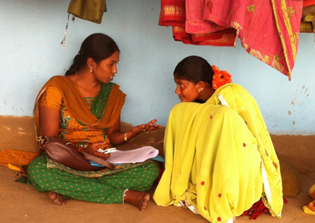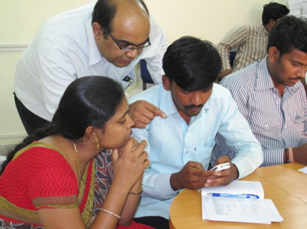Welcome to the Evaluation 2013 Conference Local Arrangements Working Group (LAWG) week on aea365. My name is Fatima Frank. I am the Evaluation Specialist for evalû, a small consulting firm that focuses exclusively on rigorous evaluations of social and economic development initiatives. I was recently part of a discussion with fellow evaluators on how organizations with limited resources can utilize common and affordable technological tools to improve on-the-ground data collection. This happens to be an area in which evalû has had great success.
Lessons Learned: Using paper surveys for data collection can create big hassles and inefficiencies. In addition to spending valuable time on data entry, transferring data from paper surveys to an electronic database leaves a lot of room for errors. And, really, who wants to carry, organize, and track hundreds of paper surveys?
Rad Resource: We have become big fans of EpiSurveyor (soon-to-be Magpi), an open access mobile technology tool for data collection. For those who aren’t familiar with Episurveyor, it’s a mobile phone and web-based data collection system developed and supported in Kenya, and used by hundreds of organizations in over 170 countries. Below are a few reasons why we use EpiSurveyor:
- It’s free!
- Extremely user friendly. Our evaluators are all self-taught users. You can also easily transfer knowledge and skills to field staff and enumerators. We’ve found that field offices are very proactive in adopting EpiSurveyor, and often tell us that they plan on using it beyond our engagement with them.
 Managing data collection and oversight is easy since submitted data can be viewed in real time on the EpiSurveyor server. Data or project managers can view the data in their EpiSurveyor account as it’s being sent from anywhere!
Managing data collection and oversight is easy since submitted data can be viewed in real time on the EpiSurveyor server. Data or project managers can view the data in their EpiSurveyor account as it’s being sent from anywhere!- The GPS function allows data and project managers to track geographic data, follow enumerators, and make sure the project and evaluation target area is being adequately covered.
- Check out our full review here.
If you’ve used EpiSurveyor or another mobile data collection tool, tell us about it here or on our blog. Also, be sure to follow us on Twitter to see some of our work in the field.
Hot Tip—Insider’s advice for Evaluation 2013 in DC: The 2013 AEA conference is coming to DC! DC has an abundance of free museums and one of my favorites is The National Portrait Gallery in Chinatown. Be sure to check out the lovely Kogod Courtyard. Afterwards, stroll into Chinatown for a bite to eat.
We’re thinking forward to October and the Evaluation 2013 annual conference all this week with our colleagues in the Local Arrangements Working Group (LAWG). AEA is accepting proposals to present at Evaluation 2013 through until March 15 via the conference website. Do you have questions, concerns, kudos, or content to extend this aea365 contribution? Please add them in the comments section for this post on the aea365 webpage so that we may enrich our community of practice.



Another great restaurant near the National Portrait Gallery is Jaleo, specializing in tapas. If you’re looking for a great restaurant guide for the Washington area, check out the Washingtonian’s 100 Very Best Restaurants guide: http://www.washingtonian.com/packages/food-drink/the-100-very-best-restaurants-2013/
Very helpful review of Magpi! What a cool idea.
When you stop to eat in Chinatown during the AEA Conference, I would suggest Eat First at 609 H Street. They are not too expensive, and they have a huge selection of tasty dishes, including lots of vegetarian options.
Just came across this TED talk for more about Magpi…
http://tedxtalks.ted.com/video/Shining-The-Light-In-Data-Dar-2